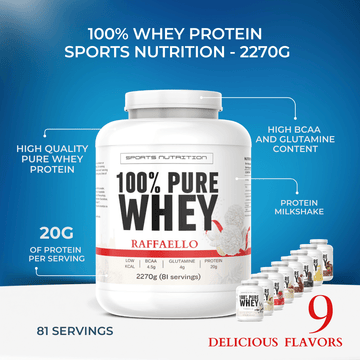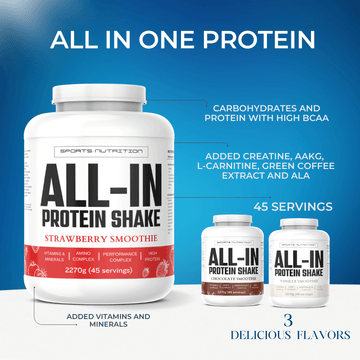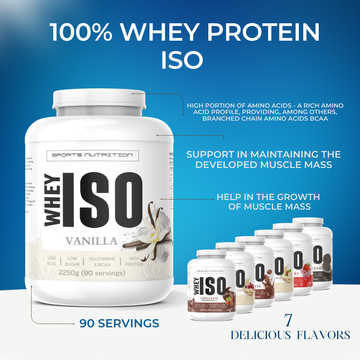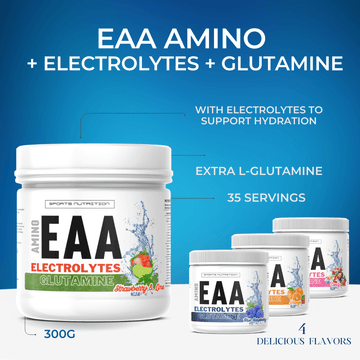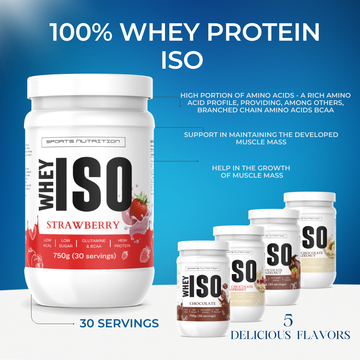BCAA
What is BCAA?
BCAAs branched chain amino acids are a very popular dietary supplement include three amino acids: valine, isoleucine and leucine. This dietary supplement is a great source of wholesome protein for an athlete. It is worth noting that our muscle fibers are made up of thirty percent of these three branched chain amino acids, which is why their supply is so important when building our figure at the gym.
Leucine
- One of the most anabolic amino acids.
- It reduces muscle breakdown during intense training.
- It stimulates protein synthesis.
- Accelerates recovery between training sessions.
- It stimulates the metabolism.
- It prevents muscle catabolism in the period of fat reduction.
Valine
- Plays an important role in providing energy to muscle cells.
- It protects muscles against catabolism.
- Accelerates post-workout regeneration.
- It reduces muscle soreness.
- It improves the hormonal balance.
- It reduces the level of cortisol in the body.
Isoleucine
- It increases the level of energy in muscle cells.
- Increases muscle endurance.
- Accelerates regeneration.
- It supports building lean muscle mass.
- It stimulates protein synthesis.
BCAA - benefits:
The benefits of BCAA supplementation have been confirmed by numerous studies. A 2012 study found that athletes taking 10 g of BCAAs before and after training had significantly fewer complaints of muscle aches compared to those who did not take BCAA supplementation. In addition, people taking BCAA supplements reported greater gains in muscle mass and faster muscle recovery. It can be said that taking BCAA supplements gives us many different positive effects: inhibiting muscle breakdown, accelerating muscle recovery, increasing muscle resistance. The use of BCAA supplementation has a positive effect on body sculpting, reduces the level of adipose tissue and positively influences our reactions to stress and pain related to physical exertion.
Dietary sources of BCAAs
Essential amino acids, the group to which branched chain amino acids (BCAA) belong, are found in products mainly of animal origin - meat, fish, dairy products or eggs. They can also be found in products of plant origin, such as soybeans. You can find BCAAs in classic products such as turkey breast. These products also contain more leucine than other amino acids, which is the same when we look at the composition of the powdered supplement.
BCAA for who?
First of all, BCAAs are recommended for people on a diet that reduces the level of adipose tissue. The supplement will then slow down or stop the process of burning muscle tissue while reducing body fat. Active people who are not on such a diet can also reach for BCAA. Branched chain amino acids will help them regenerate and maintain muscle mass.
How to use BCAA?
It is generally accepted that BCAA dosing is dependent on body weight. Most of the most reliable studies on this subject say a maximum dose of about 1 g for every 10 kg. The method of taking suggested by most trainers is 10 g per day - 5 g before training and 5 g after training. The most important thing is to make sure that the supplement you choose has 100% of the amino acids listed previously. It is always good to remember that BCAA dosage is primarily a highly individual matter. As with any other dietary supplement, also this time you have to be cautious. It is best to consult it not only with a personal trainer, but above all with a dietitian who arranges diets for athletes on a daily basis. Based on the interview, diet and your training plan, he will write you the correct dosage of BCAA, thanks to which you will improve your results.
